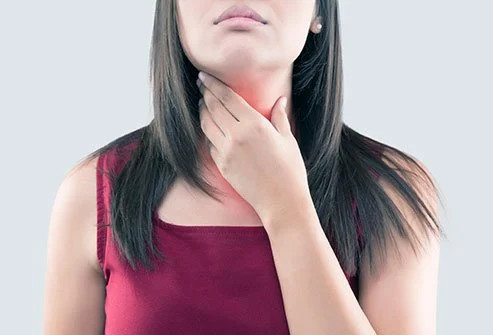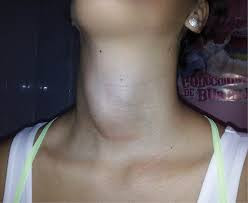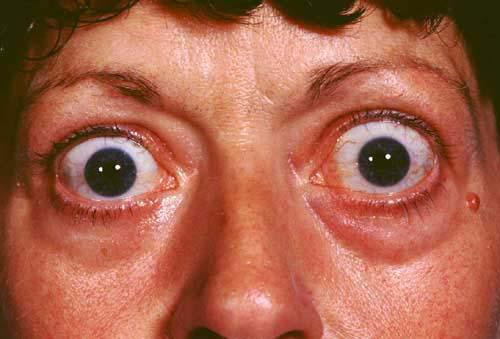Definition
Thyrotoxicosis is a clinical condition where excessive thyroid hormone circulates in the body. While hyperthyroidism, the overproduction of thyroid hormone by the thyroid gland, is a common cause, thyrotoxicosis can occur even without an increase in thyroid hormone production.
The thyroid gland, located at the front of the neck, produces two important hormones—triiodothyronine (T3) and thyroxine (T4)—which regulate various bodily functions such as heart rate, body temperature, and metabolism. Metabolism refers to chemical reactions in the cells that process energy for use by the body.
When thyroid hormone levels are elevated, they speed up the body’s metabolic rate, leading to a range of symptoms and potential complications. Although treatable, the management of thyrotoxicosis will depend on the underlying cause.
Causes
Thyrotoxicosis can result from several conditions, including:
Hyperthyroidism
Hyperthyroidism is the most frequent cause of thyrotoxicosis. In this condition, the thyroid gland produces and releases excessive amounts of thyroid hormone. A major cause of hyperthyroidism is Graves' disease, an autoimmune disorder where antibodies stimulate the thyroid to produce excess hormone. Thyroid nodules (lumps) can also lead to hyperthyroidism and, in turn, thyrotoxicosis.
Thyroiditis
Inflammation of the thyroid (thyroiditis) can cause a temporary surge in thyroid hormone release. It may be triggered by:
- Bacterial or fungal infections
- Autoimmune conditions
- Medications like lithium and interferon
Thyroiditis can also occur postpartum, following childbirth.
Drugs
Individuals receiving excessive iodine, such as in radioactive iodine therapy, can develop thyrotoxicosis. The antiarrhythmic drug amiodarone, which contains a high iodine content and a structure similar to the T4 hormone, is also known to cause this condition. Overuse of thyroid medications can similarly lead to thyrotoxicosis.
Excessive Thyroid Hormone Intake
A rare condition known as hamburger thyroiditis can occur when people consume meat contaminated with thyroid tissue, leading to excessive thyroid hormone intake. Intentional overuse of thyroid medications can also result in this condition.
Risk Factor
Anyone can develop thyrotoxicosis, but the condition is more common in women than in men, and the risk increases with age. Thyrotoxicosis is estimated to affect around 2% of women and 0.2% of men globally.
Additional risk factors include:
- Family history of thyroid disease, particularly Graves' disease
- Genetic mutations in the TSHR gene, affecting thyroid function
- Being over 60 years of age
- Having autoimmune disorders such as type 1 diabetes mellitus or Addison’s disease (a disorder of the adrenal glands)
- Recent childbirth
Symptoms
Excess thyroid hormone levels accelerate the body’s metabolism, leading to various symptoms, such as:
- Unexplained weight loss
- Irregular or rapid heartbeat (>100 beats per minute)
- Muscle weakness
- Tremors in the hands
- Anxiety and irritability
- Increased sensitivity to heat
- Excessive sweating; warm, moist skin
- Eye issues
- Changes in menstrual cycles
In severe cases, this condition can escalate into a thyroid storm, which is life-threatening and requires urgent medical attention. Symptoms of thyroid storm include a very fast heartbeat, high fever, diarrhea, and mental status changes, such as confusion or loss of consciousness.
Diagnosis
To diagnose thyrotoxicosis, your doctor will conduct a thorough medical interview, physical examination, and relevant tests.
The doctor may inquire about:
- The primary symptoms and other accompanying complaints
- Duration of the symptoms
- History of any past illnesses
- Family history, especially thyroid-related conditions
A physical examination will include checking vital signs (blood pressure, breathing rate, pulse, and body temperature), and a thyroid examination for any enlargement or lumps. Additional tests will confirm the diagnosis, such as measuring thyroid hormone levels (thyroxine and triiodothyronine), where elevated levels along with low TSH (thyroid-stimulating hormone) indicate thyrotoxicosis. Other tests may include radioactive iodine uptake, thyroid ultrasound, and thyroid scans.
Management
Treatment for thyrotoxicosis depends on the underlying cause and the results of the diagnostic tests.
Medications prescribed may include:
- Fluid rehydration therapy for dehydration
- Beta-blockers to reduce tremors, rapid heartbeat, and alleviate nervous system effects
- Glucocorticoids for eye symptoms and pain management
To address elevated thyroid hormone levels, treatment options include:
- Antithyroid drugs to inhibit the overproduction of thyroid hormones, particularly in hyperthyroid patients
- Radioactive iodine to shrink the thyroid gland, reducing hormone production
- Thyroidectomy (surgical removal of the thyroid gland) as a recommended therapy in certain cases
Lifelong thyroid hormone replacement therapy may be required after treatment to maintain normal hormone levels. Consultation with a doctor is essential to tailor the treatment plan.
Complications
If untreated, thyrotoxicosis can lead to several complications, such as:
- Heart problems
Thyrotoxicosis can disrupt heart rhythm, heightening the risk of stroke and heart failure.
- Osteoporosis
Excess thyroid hormone can hinder the body’s ability to store calcium in the bones, leading to brittle bones and osteoporosis.
- Graves' eye disease
Hyperthyroidism can cause swelling, redness, and other eye problems.
- Thyroid storm
This is a rare, life-threatening condition where the thyroid suddenly releases large amounts of hormone, often triggered by surgery, infection, or abrupt discontinuation of antithyroid medication.
Prevention
To prevent thyrotoxicosis, it is important to take thyroid medication only as prescribed and avoid exceeding the recommended dose. Additionally, supporting your treatment with a healthy lifestyle can help manage the condition. Ensure you stay hydrated, get enough sleep, and maintain a balanced diet.
When to See a Doctor?
If you notice symptoms of thyrotoxicosis or have a family history of thyroid disorders, it’s essential to seek medical advice promptly. Consult with an internist to evaluate and manage your condition effectively.
Looking for more information about other diseases? Click here!
- dr Hanifa Rahma
Cleveland Clinic - Thyrotoxicosis (2021). Retrieved 5 March 2023, from https://my.clevelandclinic.org/health/diseases/21741-thyrotoxicosis#.
Mayo Clinic - Thyrotoxicosis: Diagnosis and MAnagement. (2019). Retrieved 5 March 2023, from https://www.mayoclinicproceedings.org/article/S0025-6196(18)30799-7/fulltext.
Medscape - Hyperthyroidism and Thyrotoxicosis (2022).Retrieved 5 March 2023, from https://emedicine.medscape.com/article/121865-overview.
WebMD - What is thyrotoxicosis? (2022). Retrieved 5 March 2023, from https://www.webmd.com/women/thyrotoxicosis-hyperthyroidism.











